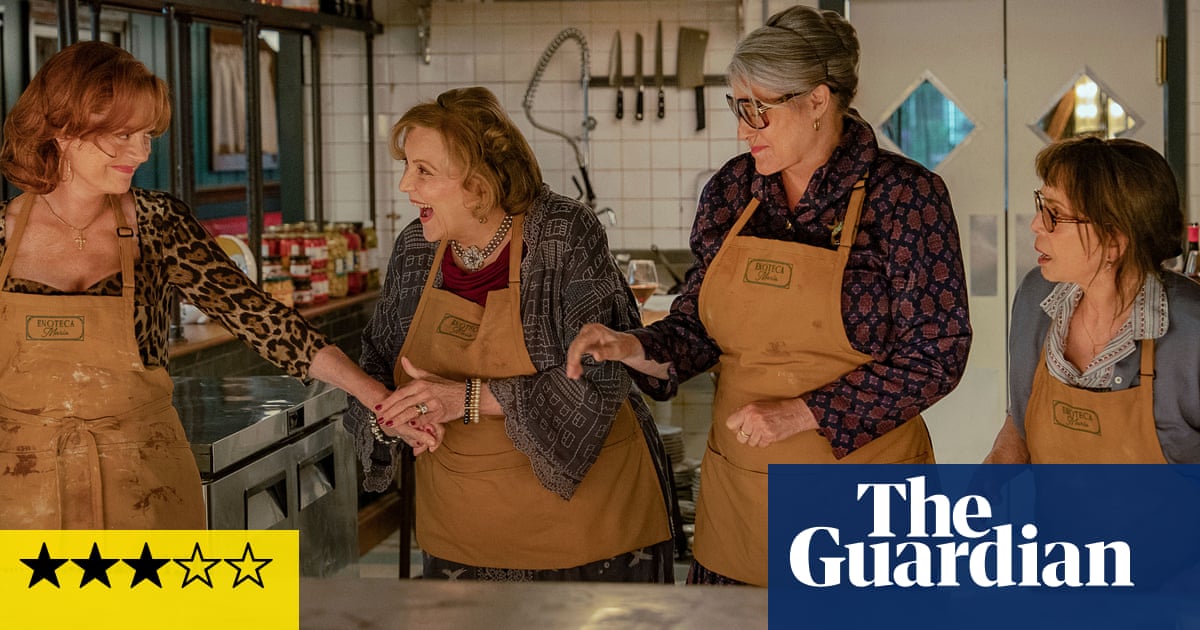There’s a great deal of warmth both in and out of the kitchen in Netflix’s remarkably charming new food comedy Nonnas, a simple yet satisfying fact-based crowd-pleaser landing just in time for Mother’s Day across many countries in the world. It’ll make for an easy post-lunch choice for families gathering this weekend, providing the sort of mechanically proficient pleasures that used to be far more common back in the 80s or 90s. The platform has tried, and mostly failed, to resurrect the kind of endlessly played, easily rewatchable cable movie favourite and while this still might not be quite as fondly remembered in the decades to come, it’s a better simulation than most.
To those with less of an Italian component to their family, anonnais a grandmother, the stereotype of which spends a great deal of time in the kitchen, preparing food with equal parts garlic and love. For Joe (Vince Vaughn, in reliable been-around-the-block mode), the death of both his nonna and then his mother has left him feeling unmoored, questioning what to do with himself and his life going forward. We’ve seen a great deal of stories based around sons and their fathers but it’s uncommon to explore what a mother means to a man in the same serious way, a strangely untapped relationship on screen. For Joe, the loss has led to a pervading chill and his unlikely solution is to use the money from her life insurance to open a restaurant in Staten Island.
He’s a decent cook, having watched and learned in the kitchen for most of his life, but he needs help. His idea is to rely on the wisdom and experience of nonnas, first his mother’s stern longtime best friend (Lorraine Bracco) and then, through an ad on Craigslist, he finds two more (Brenda Vaccaro and Talia Shire). After he completes the kitchen with another of his mother’s friends (Susan Sarandon), they go to work.
The beats that make up the renovation and opening of a restaurant are what we’ve mostly come to expect from watching easily consumed reality television and there’s an obvious, hard-to-resist pull to watching it all come together. While director Stephen Chbosky might have tripped up with his execrable adaptation of the cursed musical Dear Evan Hansen, he showed in The Perks of Being a Wallflower and Wonder that he understands how to deal with the often exaggerated rhythms of feelgood fare such as this. It’s a plainly sentimental movie but it’s never a cloying one, Liz Maccie’s script also guiding us toward big emotions in a way that doesn’t force us to feel. It’s surprising how delicate some of the moments end up playing despite the territory.
These moments come not just from Vaughn feeling the presence of family once again but also from these four older women being given the opportunity to feel useful and active again. The post-Book Club stream of films giving women over the age of 60 lead roles again has been mostly a bust, wasting actors such asKathy Bates,Alfre Woodard,Jacki Weaver,Sally FieldandSarandonherself in silly slop that they should have the choice and freedom to turn down. Nonnas offers these women something far less patronising and mostly less juvenile (for once, no accidentally-does-drugs-at-awkward-moment sequence – hurrah – although some slapstick kitchen sparring wears a little thin) and while more depth could inevitably be afforded to each character (a scene of the quartet getting tipsy on limoncello while sharing their regrets is so effective that we crave more), there’s something unusually more human about how the women are treated. We’re used to seeing Sarandon giving us her best (although she’s far better suited to playing the glamorous pastry chef here than she was as Crazy Cat Lady in The Fabulous Four) but reuniting us with Shire, Bracco and Vaccaro feels like a treat, actors who haven’t had quite the same boost from the slight uptick in older women on screen, old friends rejoining us at the table.
While I wasn’t expecting it to come near the unreachably high bar set by the recent cookery classic The Taste of Things, I could have done with perhaps a little more of the process of preparing the dishes. There’s just about enough of the sensual pleasures of food to make us hungry but not quite as much detail as I would have liked. Most importantly though, Chbosky makes us genuinely care what happens to the business as the last act comes around because as formulaic as the film might be, there’s a refreshing lack of unnecessary added conflict. It remains grounded and focused (and one would imagine, mostly true to life) and so when the wins come, they’re far easier to cheer for. Nonnas has a straightforward sincerity that makes it go down easily.
Nonnas is now available on Netflix
